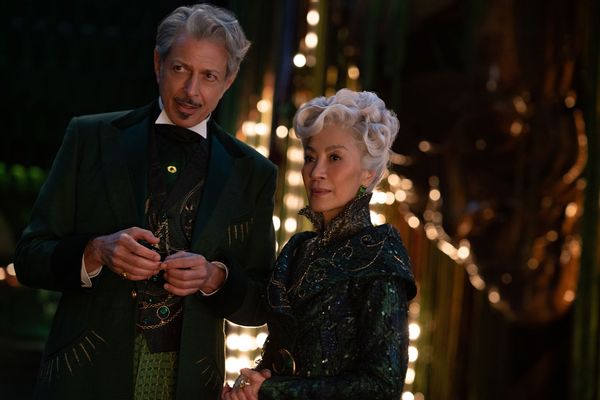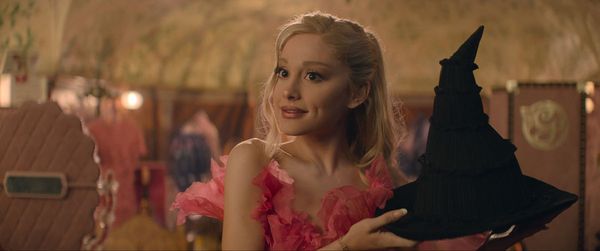The “Wicked” nation is still relatively young, like the musical itself. This year marks its 21st anniversary on Broadway, and the touring version has consistently crisscrossed the country since its earliest days, thrilling audiences with its revisionist version of L. Frank Baum’s “The Wizard of Oz.”
In this telling of the American fairy tale, the hero edit goes to Elphaba Thropp, the naturally gifted sorceress who eventually becomes the Wicked Witch, memorialized by her school-days friend at Shiz University by Galinda Upland. Galinda is perky, blonde, self-involved and universally adored, presumably from the moment she trilled into the world.
Elphaba, in contrast, is a naturally talented sorceress whose green skin led her father to reject her from the moment she was born. Their shared journey makes “Wicked” a magnet for like-minded souls drawn to its theme of misfit friendships.
What I noticed when I saw the touring production quite recently, is that the theater was packed with mothers, sisters and daughters. Many of the younger members swathed in sequins and tulle skirts. Relatively few chose to cosplay Elphaba. Regardless, it was an ecstatic communal event with many cheers, laughter and enthusiastic applause.
So why was I so livid as I left the theater?
That’s a rhetorical question. I know why. It has nothing to do with the performers or Stephen Schwartz and Winnie Holzman’s libretto, which I was familiar with long before seeing the stage production for the first. My anger was a matter of timing.
The first half of the “Wicked” movie adaptation marks a place in our cultural history similar to how “Rogue One: A Star Wars Story” landed in theaters weeks after Donald Trump first won the presidency in 2016.
That shock disillusioned progressives who’d bought into the fantasy that Barack Obama’s two presidential terms signaled an evolution to a more equitable future for America.
“Right now hope looks foolish,” Salon’s Amanda Marcotte wrote back then. “People who give in to hope start chasing impossible dreams.” To that, Felicity Jones’ Jyn Erso reminded her “Rogue One” compatriots that “rebellions are built on hope.” Jyn was right, but she didn’t live to see it.
“Wicked” is an allegory about manipulated history. Thanks to the 1939 movie version of “The Wizard of Oz,” Americans know the same story Oz’s citizens were told about Elphaba, all of us accepting that propaganda as gospel.
My husband and I watched the theatrical performance on the Sunday that followed an election that reminded me yet again how much disdain America has for women, especially Black women.
The actor playing Elphaba in the stage production I attended isn’t Black. Neither is Idina Menzel, who originated the role on Broadway, with Kristin Chenoweth as Galinda/Glinda. Casting Cynthia Erivo to play her in the movie, though, meets a moment that wasn’t as in our faces in 2003 as it is right now.
Friendship gained and lost isn’t the only theme of “Wicked,” but it is the glittering text to the subtext of discrimination, dehumanization and subjugation.
Elphaba’s existence is a miracle reframed as an obscenity. She is extraordinary in every way, yet the world demands that she dim her ability and treat her intellect as if it were an offense.
Even her laugh is taken as something sinister, until she’s granted acceptance, temporarily, thanks to the normalizing endorsement of Ariana Grande’s limber, lithe, perky and bubbly blonde Galinda, swinging her golden locks with a “toss, toss.”
Cynthia Erivo as Elphaba and Ariana Grande as Glinda in “Wicked” (Universal)“Kamala Harris is a woman who has had her racial identity questioned, has had her name made fun of, has been demeaned for not having biological children, has been accused of sleeping her way to the top, and has been degraded for her laugh, her clothing style — all of the things that are completely irrelevant to her qualifications and her achievements,” said my colleague Mary Elizabeth Williams in her trenchant video response the election results.
“. . . What do you think that says to us as women?” Williams added. “What do you think that says to survivors of sexual violence? What do you think it says to women of color?”
This is what whizzed through my mind as I watched “Wicked” play out onstage: According to NBC News and CBS News exit polls, white women voted for Trump 53% to 45% in 2024. That’s not much of a shift from 2020 when 55% supported Trump, or 2016 when 52% supported Trump.
In the last two presidential elections, and certainly in the most recent, there was the perfunctory celebration of Black women saving democracy with white women promising this time they’d do better.
But Black women had to know deep down that neither the Galindas nor the Glindas would switch sides for a leader who promised to do better for and by all of us, and for democracy. It’s all right there in the lyrics of “Defying Gravity”: “I hope you’re happy, I hope you’re happy, too,” Elphaba sings to Glinda. “I hope you’re proud, how you would grovel in submission.” Elphaba seems not terribly surprised, just disappointed. Some of us know the feeling.
Anyway, that’s how the first act ends. By the close of the show, Elphaba and Glinda have mended their friendship – and here’s the part that I think set me off: Elphaba apologizes to Glinda which, in the musical, Glinda does not reciprocate. Not long afterward Dorothy comes on the scene with a bucket of water, etcetera, etcetera.
Since the movie and musical open with the Munchkins stomping out a number that celebrates the Wicked Witch’s demise, this isn’t blowing anything for you. “No one mourns the wicked!” the Oz folk triumphantly harmonize. But, yes – the whole message rubbed me the wrong way.
Musicals are an emotionally charged art form by design, but “Wicked” is next level. All the pregame excitement for, and bracing to be annoyed about, impromptu sing-a-longs in movie theaters is proof.
I could be wrong, but I don’t remember many anticipatory social media posts of teens warming up to croon “Tonight” during screenings of Steven Spielberg’s “West Side Story” revival. Then again, most of Tony and Maria’s fans have aged out of any extrovertive display that doesn’t involve a martini or three.
“Wicked,” in contrast, is a series of duets and solos about friendship, loathing and a friendship that blossoms out of loathing – the series arc of girlhood’s affections. I imagine that younger fans ardently connect Glinda and Elphaba’s inconstant relationship to the ups and downs of their own.
If you are woman of color who counts among her former friends a Galinda-type, what happens may seem familiar.
Youthful readings of movies, music and TV are simpler. Elphaba is a power fantasy for outcasts. Glinda is confident and fashionable and hilariously blind to her egomania. Later she realizes with great regret, and too late, the corrosive cruelty in which she participated for her benefit, carried out by a talentless, ordinary man who demonizes her friend purely for political benefit. But at least they find their way to liking each other again.
 Jeff Goldblum as The Wizard of Oz and Michelle Yeoh as Madam Morrible in “Wicked” (Universal Studios)
Jeff Goldblum as The Wizard of Oz and Michelle Yeoh as Madam Morrible in “Wicked” (Universal Studios)
Friendship gained and lost isn’t the only theme of “Wicked,” but it is the glittering text to the subtext of discrimination, dehumanization and subjugation in a realm where a conman from Kansas fools an overcredulous population into believing he’s a wizard.
“When I first got here, there was discord and discontent,” The Wizard (Jeff Goldblum) explains to Elphaba when he thinks she shares his addiction to being a celebrity. “And where I come from, everyone knows: the best way to bring folks together, is to give them a really good enemy.”
Erivo is one the finest singers of our time, slaying the role of Aretha Franklin before stepping into Elphaba’s chunky boots. But her Blackness calls attention to Elphaba’s specific othering in a way the audience might ignore when white actors wore her pointed hat.
The witch’s green skin originated in the 1939 movie. In the book Baum merely set her wickedness as antipodal to Dorothy Gale’s pluck and goodness.
Want a daily wrap-up of all the news and commentary Salon has to offer? Subscribe to our morning newsletter, Crash Course.
Director Jon M. Chu’s Oz is a technicolor fantasy and multicultural wonderland, with major characters played by Black, brown and Asian actors – notably Michelle Yeoh as Madame Morrible, the Dean of Sorcery at Shiz and, at first, Elphaba’s champion. Eventually she becomes Elphaba’s enemy, although she isn’t the first to claim that title.
Grande’s Galinda leaps into that part with aplomb. Elphaba flings her hatefulness back at her until the day perpetually rosy Galinda, in a two-part act of sabotage, offers the plain-dressed Elphaba the hat that becomes her signature look, knowing the rest of their Shiz classmates will mercilessly tease her.
 Ariana Grande as Glinda in “Wicked” (Universal)But Elphaba mistakes it for a peace offering, and in a lopsided exchange gives Galinda the thing she wants most, an entry to an exclusive world. So Galinda cashes in some of her cred to bestow some normalizing popularity on her green-skinned classmate who, in one night, becomes her friend.
Ariana Grande as Glinda in “Wicked” (Universal)But Elphaba mistakes it for a peace offering, and in a lopsided exchange gives Galinda the thing she wants most, an entry to an exclusive world. So Galinda cashes in some of her cred to bestow some normalizing popularity on her green-skinned classmate who, in one night, becomes her friend.
If you are woman of color who counts among her former friends a Galinda-type, what happens next may seem familiar. It may have somewhat prepared you for the way things turned out on Nov. 5. As Elphaba’s profile rises, Galinda glides with her in her wake . . . until the moment comes that forces Miss Upland to choose between joining her BFF in righteous exile and increasing her popularity on a gargantuan scale.
Assuming you’ve seen “The Wizard of Oz” — and more people have than read Gregory Maguire’s 1995 novel, which inspired the musical – you already know what decision she makes.
“Her green skin is but an outward manifestorium of her twisted nature,” says the person calling for Elphaba to be hunted. “This distortion . . . this repulsion . . . this Wicked Witch.”
Elphaba is none of those things. We’ve seen that. Glinda knows it too. But obeying the man in charge works out better for Glinda. Oz’s history proves it. So does American history.
The beauty of “Wicked” the movie is that it ends on the story’s highest note, with Elphaba choosing to resist and fly free instead of complying with a corrupt government. The CGI glamour throughout “Wicked” can be intoxicating, but in this climax it enables Erivo’s Elphaba to soar like a comet and declare her independence with exhilarated determination:
So if you care to find me
Look to the western sky
As someone told me lately
“Everyone deserves the chance to fly”
It’s a temporary victory. It’s also a gift to the disenchanted who need reminding that there’s nothing new about the story we’re living in, that the people who stand to be harmed more than most will still grasp for the popular choice if it means they get to ride in a pretty bubble. But I’d much rather be like the pariah holding on to magic in her bag and a broom that’s no longer meant for cleaning up other people’s messes.
“Wicked” is now playing in theaters nationwide.
Read more
about this topic



























